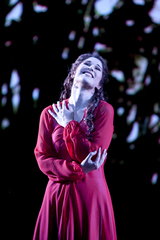Nicole Car’s face at curtain cal l said it all. It was the radiance of a young girl who has just fallen in love for the first time. The triumph of a performer who knows she’s done good. It’s called Eugene Onegin but this production might more accurately be called Tatiana, because her emotional journey maps this beautiful show.
l said it all. It was the radiance of a young girl who has just fallen in love for the first time. The triumph of a performer who knows she’s done good. It’s called Eugene Onegin but this production might more accurately be called Tatiana, because her emotional journey maps this beautiful show.
Opera Australia has partnered with the Royal Opera House, Covent Garden, in bringing a new production of Tchaikovsky’s youthful favourite to Sydney. The director is new Covent Garden Artistic Director, Kasper Holten, with integral choreography by Signe Fabricius and stand out costumes by Katrina Lindsay. It’s a bold interpretation, which drew plenty of flak in its premiere season in London, but here, whether by virtue of the audience, or the location, or the cast – and my guess is it is the cast - it all just works.
The main conceit is to fashion Tatiana’s unrequited love story as a flashback, adding a layer of hindsight, regret and wisdom to the impulsive actions of a young girl. Holten does this via dance, with Tatiana and Onegin each assigned a dancing double to amplify the emotions during their pivotal arias. So in the Letter Scene, Tatiana-the-singer watches Tatiana-the-dancer – Emily Ranford - writing the letter, while in the Duel, Onegin-the-singer commits the deed while Onegin-the-dancer – Sam Colbey - bids a grief-stricken farewell to his best friend. The choreography is imaginative but subtle, and the dancers are fluent and assured, taking their place on the stage as equal partners to the principals, an elegant and intelligent commentary on the runaway events.
Elsewhere in the production dance plays a more traditional role: peasants stomp, gentlefolk waltz and courtiers do the cotillion. Holten has other plans for the famous Polonaise: as the on form Australian Opera and Ballet Orchestra do battle with its tricksy corners, another drama plays out on stage. Onegin’s Idyll, as it were, see him bombarded by a succession of willing dance partners, each one more attentive than the last. He is spat out at the palace of Prince Gremin quite exhausted and empty. Which works, musically and dramatically.
Less successful is the treatment of the chorus, who are frequently pushed to the edges. The splendid Opera Australia Chorus end up looking like supernumeraries, milling around in embarrassment at the end of Tatiana’s birthday party.
Vocally, this production has plenty to enjoy. Slovakian-born Dalibor Jenis makes a convincing debut in the title role: no real fireworks, but a consistent, attractive tone and good stage presence. As Lensky, James Egglestone’s performance is more uneven: at his best he makes a wonderful sound, with a winning portrayal, but his sustained legato phrases sometimes seem very thinly spread. The two cameo arias, from Monsieur Tricquet and Prince Gremin, are delivered with nice restraint and superb polish by Kanen Breen and Konstantin Gorny. Gorny’s Russian bass is the real deal.
Dominica Matthews is a Mrs Bennet-like Madame Larina, her voice sitting nicely in the low register. Sian Pendry is a sound but forgettable Olga, while Jacqueline Dark is a wonderfully observed Filippyevna who manages to endear herself to the audience in spite of wearing a flowerpot on her head. In the end, however, the show belongs to Nicole Car. Physically, she takes her cues from her dancing double, an airy, slip of a girl floating through life in a dream. Musically, she is utterly focused. Her voice still has the lightness and clarity of a young girl, but she steps up to the climactic high notes with thrilling poise. Car recently won first prize in Germany’s Neue Stimmen competition, so word is out. I’m sure I’m not the only one keen to see and hear what she does next.

 l said it all. It was the radiance of a young girl who has just fallen in love for the first time. The triumph of a performer who knows she’s done good. It’s called Eugene Onegin but this production might more accurately be called Tatiana, because her emotional journey maps this beautiful show.
l said it all. It was the radiance of a young girl who has just fallen in love for the first time. The triumph of a performer who knows she’s done good. It’s called Eugene Onegin but this production might more accurately be called Tatiana, because her emotional journey maps this beautiful show.





